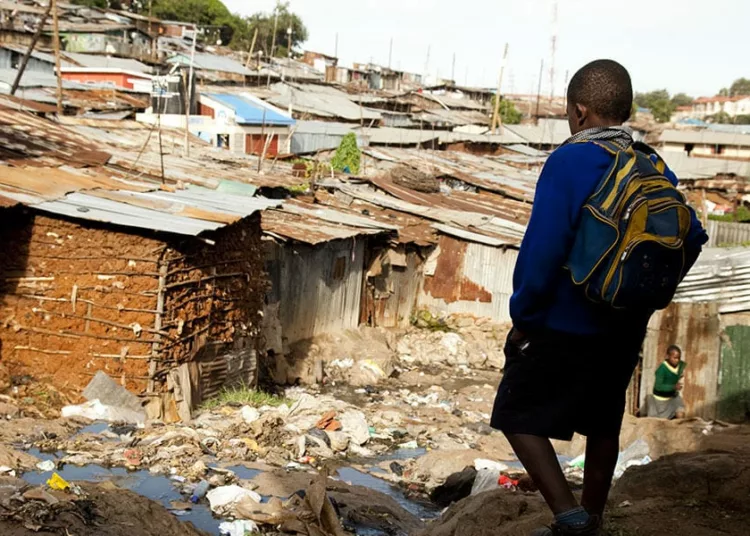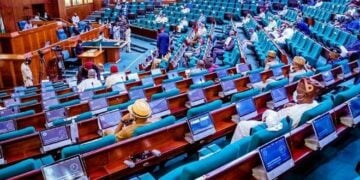Poverty, the state of having little or no income and few material possessions, is a reality in Nigeria and it depicts a lack of food, clothes, education, and other basic amenities.
With the recent report by the National Bureau of Statistics (NBS), it is glaring that most Nigerians are poor people who lack basic necessities of life to a degree that it can be wondered how they manage to survive.
In its latest National Multidimensional Poverty Index (MPI) Report, the NBS revealed that Nigeria now houses 133 million poor people, who lack access to health, education, living standards, employment, and security.
“Overall, 65 per cent of poor people (86 million people live in the North, while 35 per cent, nearly 47 million, live in the South). In general, a disparity between North and South is evident in both incidence and intensity of multidimensional poverty, with the North being poorer.
“However, the level and number of poor people need to be addressed in all zones, each of which are home to between 11 and 20 million poor people except North West, which has 45 million poor people due to its larger population and higher level of poverty.
“Also, 72 per cent of people in rural areas were poor. It is the same for 42 per cent of people in urban areas,” the report revealed.
Giving a breakdown of the situation, the NBS report showed that states like Sokoto, Bayelsa, Gombe, Jigawa, and Plateau are the top poorest states in 2022.
Sokoto leads the poorest with 90.5 per cent of poor people; followed by Bayelsa with 88.5 per cent, Gombe with 86.2 per cent, Jigawa with 84.3 per cent, and Plateau with 84 per cent.
The least poor states are Ondo with 27.2 per cent of poor people, Lagos with 29.4 per cent, Abia with 29.8 per cent, Edo with 31 per cent, and Anambra with 32.1 per cent.
Examining The Lagos Situation
Though Lagos falls under states with the lowest number of poor citizens, with 29.4 per cent of its population, representing 4.5 million are poor, the state government in collaboration with the United Nations Children’s Fund (UNICEF) was the first sub-national government in Nigeria to proactively seek to harmonize her Social Interventions through a State Social Protection Policy.
In 2013, the Lagos state Ministry of Economic Planning and Budget (MEPB) was saddled with the responsibility of designing a Lagos State Social Protection Policy (LASSPP), whereby a technical working group was set up with adequate consultation of different stakeholders and relevant Lagos state Ministries, Departments and Agencies (MDAs).
Consultations and community dialogues were held with all stakeholders across the three Senatorial Districts in the state and the inputs collated were used to produce the draft policy.
The executive secretary of the Lagos Civil Society Participation for Development (LACSOP), Dede Kadiri while speaking with LEADERSHIP Weekend, at a forum aimed at building the capacity of Civil Society Organisations to drive the implementation of the LASSPP, said in 2020 Lagos state faced the reality of the absence of a social protection policy that should provide a safety net for its teeming poor population when it locked down following the spread of COVID-19.
“At that time, Lagos experienced a fast decline into poverty, crime, hunger, and anarchy, as its 40 per cent poor population saw their options for survival decrease,” Kadiri recounted.
This situation led to the speedy adoption of the LASSPP in August 2020 and it presented the state with a new opportunity to begin a sincere and collaborative effort to reduce poverty. Commencing the process of policy development in 2013 and approving such in 2020 is definitely a long time, but the most imperative, at the moment, is the implementation of such policy to achieve its set goals and objectives.
Succinctly, the purpose of the LASSPP is to capture all existing and ongoing Social Protection (SP) interventions and formulate new ones with the aim to efficiently coordinate and seamlessly harmonise the various projects and programmes spread across different MDAs and sectors, which are achieving various degrees of success.
Understanding Social Protection
According to the LASSPP, Social Protection (SP) shall mean “A mix of policies and programmes designed for individuals and households throughout the life cycle to prevent and reduce poverty and socio-economic shocks by promoting and enhancing livelihoods and a life of dignity.”
Simplifying this, a board member of the Lagos State Health Management Agency (LASHMA), Ayo Adebusoye, said SP covers a set of policies and programmes, or tools of social justice targeted at large segments of the population to provide people with ‘stable access to a means of income and quality social services, including affordable healthcare and education, in order to reduce people’s exposure to the risks of poverty and inequality.
Also important to note is that SP is meant to prevent and reduce poverty for individuals throughout ‘the life cycle’, which means SP is effective from birth to death, Adebusoye revealed, adding that, this essentially means that SP interventions shall systematically target all stages of life such that the socio-economic situation in one phase does not transmit to the next phase and cumulative benefits are achieved across generations.
Speaking on the LASSPP policy measures, LASHMA board member states that the policy measures are categorized into eight key components which include: Education and Health, Social Welfare and Child Protection, Social Housing, Livelihood Enhancement and Employment, Social Insurance Schemes, Social Assistance, Traditional Family and Community Support, and Legislation and Regulation.
“Broadly, the Policy provides for access to quality healthcare for newborns, free education for children of school age, school feeding programme at different stages; provision of capital, equipment, assistive devices and skill acquisition programmes for youths; Disability and Employment trust fund; Business supports clinic for entrepreneurs/ start-ups, artisans; Long and short term skill training/financial assistance for widow, vulnerable and Internally Displaced Persons (IDPs); Contributory pensions to citizens at 60years and above; among others,” he added.
With the above listed policy measures and many others, Adebusoye affirmed that the LASSPP, if fully implemented has the potential of reducing poverty among Lagosians, while urging Civil Society Organizations (CSOs), to play their part in achieving the implementation of the policy. “To ensure that these potentials are not left ‘untapped’, CSOs have huge roles to play towards achieving the implementation of the policy,” he said.
Challenges Hampering Its Implementation
Despite being robust, there are certain challenges that could hamper the implementation of the LASSPP, even as a member of LACSOP, Omolara Olusaiye, disclosed that the policy lacks clear pathways for the inclusion of CSOs in facilitating citizens’ engagement, and does not effectively synergise the multiple efforts of MDAs in the state.
More importantly, Olusaiye said the policy is currently not publicly accessible making it difficult for citizens to be aware of its provisions and hold the government accountable for implementation.
Adebusoye added by identifying some specific challenges of the policy which include limited fiscal capacity; the need for adequate funding of budget lines for SP programmes; limited coverage of informal economy; limited control of migrant workers; and limited coverage of workers in the formal employment by the social security schemes like health insurance and social housing, among others.
A major challenge also is the non-existence of a LASSPP Implementation Plan with key performance indicators which would guide what is expected of different stakeholders involved, Adebusoye added.
The Push For Implementation Intensifies
No doubt, engaged and informed citizens, through CSOs and Community Based Organizations (CBOs), can drive the change and help the LASSPP to attain its numerous capabilities.
On this backdrop, LACSOP recently partnered with LEAP Africa, Social Economic Rights and Accountability Project (SERAP), Centre for Citizens with Disabilities (CCD), and Women Liberation and Transformation Group (W-LIT) with support from the European Union-Agents Citizens Driven Transformation (EU-ACT) to train CSOs across Lagos on building an inclusive citizen-led engagement and accountability system for social protection in the state.
The major high points discussed at the training sessions recommended that CSOs and CBOs need to raise awareness of the existence of the LASSPP; collaborate with implementing MDAs and facilitate the implementation of social interventions to ensure targeted beneficiaries are not exempted and complement the government’s effort to mobilize funds from local and international partners to fund SP interventions.
With the reality currently applicable in Lagos and complemented by reports that have shown that despite being Nigeria’s wealthiest state, Lagos has high levels of urban poverty, with more than two-thirds of the state’s population living in informal housing, it is essential that the LASSPP is utilized to eradicate poverty in the state.
LASSPP has the tendency to eradicate poverty in Lagos State, Adebusoye said, while urging other states in Nigeria to set up their own LASSPP, to move Nigeria out of extreme poverty.
We’ve got the edge. Get real-time reports, breaking scoops, and exclusive angles delivered straight to your phone. Don’t settle for stale news. Join LEADERSHIP NEWS on WhatsApp for 24/7 updates →
Join Our WhatsApp Channel










